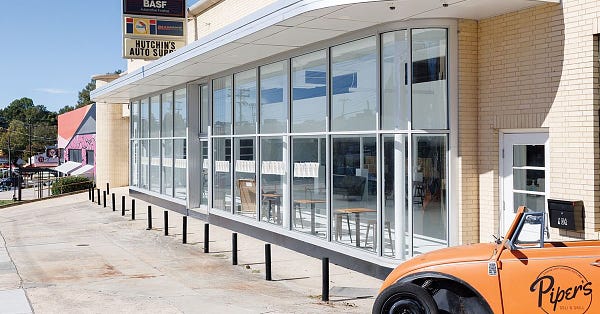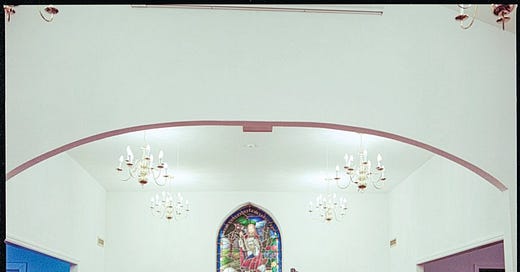Spiritual gentrification and justice & faith
Welcome to the third edition of North Carolina Religion Roundup: 'Christian-washing' of gentrification, Black clergy and justice and more.
Happy Wednesday and almost Thanksgiving! Thanks for reading the third edition of North Carolina Religion Roundup, a newsletter meant to highlight major religion news and trends in the Triangle and greater N.C. My name is Hannah. I’m an education and local government reporter at The Chatham News + Record in Chatham, N.C. and a M.Div. student at Duke Divinity School. (If you’re interested, you can read more about the newsletter and why I was inspired to start it here.)
Thanks for following along, and please reach out with any thoughts or feedback!
This week:
In Story to Follow, I take a look at the INDY Week’s in-depth report on Pioneers Church, a new church and business coming to downtown Durham which has garnered criticism for its gentrification messaging and lack of LGBTQ+ affirmation.
In Deep Dive, I examine justice and religion, with a particular emphasis on the historical role of Black clergy leading the charge.
And In a Nutshell, I include a list of N.C. religion stories to keep an eye on.
Story to Follow: Spiritual gentrification and LGBTQ+ affirmation
Last week, the INDY Week published an in-depth look at Pioneers Church, and Pioneers Durham, “a project of Pioneers Church” offering “Coffee. Tea. Baked items. Events. Co-working. Faith. Community.” and located at long-desired downtown real-estate spot 408 West Geer Street in downtown Durham.
As reporter Sarah Edwards notes in the story, skeptical comments about the church/business arose the month prior, at first due to language in both Pioneers’ church name and mission statements, and then due to the church’s non-affirming stance for LGBTQ+ members. There is a lot to unpack here, and if you haven’t read the story, I highly recommend reading it. In my opinion, Edwards did a great job in laying out the main issues at play and providing helpful examples and context that a lot of religion stories lack.
For example, the INDY article includes important context on the issue of LGBTQ affirmation, as well as insight into how Pioneer Church’s denomination plays into this particular story. The article notes some of the aesthetic differences between the United Methodist Church (of which Pioneers is affiliated) and the evangelical church, for instance. According to a survey conducted by the Pew Research Center between 2018 and 2019, as the INDY article notes, 65 percent of American adults described themselves as Christians, reflecting a 12-percentage-point drop in the last decade. What is perhaps surprising then, is that between 2016 and 2020, there was no significant decline in the share of white Americans who identify as evangelical Christians — but instead, that share grew. (A recent NYT guest essay, “Why ‘Evangelical’ Is Becoming Another Word for ‘Republican,’” explores some of the potential troublesome implications of such data.)
In comparison, the United Methodist Church often seems more progressive than the evangelical church, or is at least widely thought of that way. But the UMC too is facing its own divisions, particularly on its stance on the ordination and marriage of LGBTQ people. In 2019, worldwide delegates from the UMC voted to uphold that ban. (Last Friday, organizers of the UMC’s General Conference announced they’re moving forward with plans for a meeting next fall which would consider a split over LGBTQ beliefs, and has been delayed twice due to Covid.)
Public acceptance of homosexuality and same-sex marriage has dramatically increased in the last two decades, Pew Research data shows. Still, the survey questions themselves don’t often account for the difference between people who think same-sex marriage should be allowed and those who still believe the Bible (and by extension, God) considers it as sinful. This sort of data seems difficult to capture for many reasons, and I haven’t found it. If you have, please send it my way. I’ll update here and include in the next edition. That said, anecdotally, I know many Christians who believe this. And as the INDY article notes, many more churches in Durham are not explicitly affirming compared to those that are. Still, the social media presence and usage of extra-welcoming language exhibited by Pioneers perhaps calls for heightened skepticism of the church’s stance.
From the article: “Pioneers is certainly not alone in encountering these questions: United Methodist churches across the United States are answering them, with varying degrees of welcome, in real-time. The difference, perhaps, is that most churches do not double as a business, do not attempt the language of both radical and conditional acceptance, and are not as visible, as keenly on display, as Pioneers is in its glass showroom.”
The second issue at Pioneers noted by many residents is the evoking of gentrification in Pioneers’ messaging. The church’s website reads: “We are pioneering a vibrant and fresh approach to church uniquely for the people of downtown Durham—where creativity, compassion, belonging and purpose come together to bring hope to the heart of our city.” It outlines the organization’s aims, including facilitating “redemptive enterprise and social entrepreneurship” and providing a “space of commerce for micro-businesses and start-ups to flourish and a ‘church space’ that is open every day of the week as a local community resource to come rest, eat, dream, gather, and play.”
The church’s site also calls for “city renewal formed by faith” and hopes for seeing “Durham’s bright future manifested in our time.” A final note of interest is that Pioneer Lead Pastor Sherei Lopez Jackson is half-Latina and references her identity in vision for outreach and inclusivity. Some residents have criticized the Pioneers’ evoking of gentrification language in light of how it has historically harmed Black and Latino Durham residents.
Here are some excellent threads I saw contextualizing this sort of language on Twitter:


Scholar, writer and UNC professor Tressie McMillan Cottom on the “Christian-washing" of gentrification and “third place” theory of Capitalist change (referencing Pioneers’ vision for its coworking space and market)
Duke professor Jecca Namakkal on “settler utopianism,” a phrase used in her book “Unsettling Utopia: The Making and Unmaking of French India,” to describe when spiritual or religious groups invoke settlement language/practices
“Trend” of churches and coffee shops as “third place” spaces (this example in Greensboro)
And, a piece by Duke Divinity graduate and justice advocate and minister Alicia Crosby on spiritual gentrification and church planting
Deep Dive: Justice and the Black church
Earlier this month, Kevin Gough, a white attorney representing William "Roddie" Bryan, one of the defendants accused of murdering Ahmaud Arbery criticized the presence of Black pastors at the trial, claiming in an unsuccessful motion for a mistrial that their attendance (along with widespread media coverage of the case) made an impartial jury impossible.
Last week, the Rev. William J. Barber II, pastor from Goldsboro N.C. and a trial attendee, responded to such criticism with a Washington Post piece, “My skin color should not prevent me from attending the trial of Ahmaud Arbery’s accused killers.” In the piece, Barber outlines his 30 years of work as a minister, walking and praying “with people in hospitals and courthouses, on picket lines and in jail cells.” He is also is co-chair of the Poor People’s Campaign.
“…the Jesus I serve was clear that nations will be judged by how we treat those who are marginalized in our midst. ‘When you did it to the least of these,’ Jesus said, ‘you did it unto me.’ My pastoral ministry led me to Brunswick [location of the trial],” Barber wrote.
“When we demand justice for Ahmaud Arbery, we stand with all who challenge inequities rooted in racism and insist on affirming the image of God in all people. If this is intimidating, it is only because we have accepted for far too long a status quo in which Blackness itself can be considered a threat.”
NC Policy Watch documented a day of action led by Barber in D.C. for voting rights protections, promised reforms last Wednesday. With his words and his actions, Barber demonstrates the historical efforts by Black clergy to join local and national movements challenging various forms of racism. Just last Thursday, U.S. Sen. Raphael Warnock and U.S. Rep. Terri Sewell, both Democrats and one an ordained minister, made the religious case for protecting and expanding voting rights. The men called the right to vote “sacred” and voting rights themselves as a “faith issue” at “Race, Religion and the Assault on Voting Rights,” an inaugural event at Georgetown University’s Center on Faith and Justice.
Last Christmas, I spoke with Black pastors and Christians in Chatham County, N.C., where I work, about how they view their faith and fights for justice. I started working on the story after a white Chatham pastor yelled "white power" at a September Trump rally. With all the bad news about white Christians circulating to that event and many others pre-Election, I was curious to hear the stories of Black Christians who not only disagreed with the racist actions of their white counterparts, but actually viewed their faith as the driver for their advocacy and justice. (You can read that piece here.)
“The church can be a good training ground, and I’m asking the white church to speak up,” the Rev. Charles Mathews said at the time. The prior June, Mathews submitted a letter to the editor to the News + Record calling for police reform in Chatham.
Another pastor, Rev. Dr. Carl Thompson, told me he’d believed from a very young age that Jesus is on the side of justice. Thompson is a minister and previously served as a Chatham County commissioner.
“Is it going to be that you came together and you defeated systemic racism and that people are walking together in love?” he asked. “Or is it going to be that you took sides on political issues and because of that, we’ve inherited more race hatred and bigotry than ever before?”
In a Nutshell:
Not all the stories listed here will be written explicitly as religion stories, but I’ll include them if I think they point to a religion story to follow.
Some churches are still helping vaccinate their congregations and communities:
How some N.C. churches are reimagining ways of worship with religious construction is on the decline, by UNC Media Hub
Thanks to House Bill 890 locally owned distilleries can now sell bottled spirits on Sundays
More hateful comments from Lt. Gov. Mark Robinson, this time saying ‘heterosexuals are superior to homosexuals’ (As a reminder, Robinson has said he’s “95% sure" he will run for Governor in 2024)
Group stole $1.3 million in donation checks from church mailboxes in NC, VA, feds say
Season 2 of "Me & My Muslim Friends” podcast, made in partnership with North Carolina Public Radio, is out now
How Meatpacking Work and Faith Intersect in the Heartland (featuring interview with Kristy Nabhan-Warren, who among other things is the series editor of the new book series Where Religion Lives with The University of North Carolina Press)
Southern Baptists pivot to address church sexual abuse at the state level (More on this and N.C.-specific context to come in next edition!)
Hindu temple in Cary plans expansion that will attract ‘visitors from all over’
And lastly, I haven’t read a story on this, but I have heard of/seen many local churches offering free Thanksgiving meals, like Kings Temple in Durham, ahead of the holiday
That's it for this week's edition of North Carolina Religion Roundup. Thanks for reading. Until next time. And in the meantime, I gladly welcome any tips, feedback or news you think I haven’t included but should in future editions. — Hannah
Post photo credit: Peyton Sickles, Staff photographer with The Chatham News + Record





